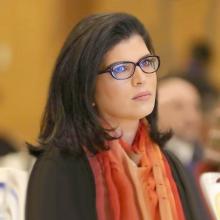
In times of conflict, the vital role of science for peace is magnified as conditions deteriorate for those who are marginalised. At times of crisis, science can and must offer a language for our common humanity. It must enable the voices of those who are not heard. Today, as we watch with horror the growing humanitarian crisis afflicting our neighbours and friends in Gaza, we must do all we can to amplify the reach of science to support those who are suffering.
Today, in response to last night’s pleas from netizens, Elon Musk revealed that his satellite-based communication system, Starlink, will provide support to internationally recognised aid organizations operating in the Gaza Strip. This news brings renewed hope and emphasises the power of collective action and the indomitable strength of the human spirit. Through a unified voice, we can speak of compassion and resilience, and it is our duty to do everything in our power to provide solace and support to those in extreme need. By uniting technological potential with spiritual connection, we reveal our true humanity and lay the foundation for a worthy peace in the 21st century.
From telecommunications and medicine to food and water, from shelter to physical and mental health, science must be empowered to protect and empower communities in turmoil. Now, more than ever, we must recognise the central role of science as a catalyst for fostering lasting peace and restoring hope to those who have lost so much through conflict.
When the guns and bombs finally fall silent, as they must as soon as possible, the science community should be prepared to lead and empower the tasks associated with reconstruction, resilience and hope. Organisations such as the Royal Scientific Society of Jordan, founded by my father, HRH Prince El Hassan Bin Talal, in 1970 in the wake of the regional devastation wrought by the 1967 war, stand ready to be at the forefront of this effort. We understand the challenging days that lie ahead for our brothers and sisters in Gaza, Palestine, located less than 150km away from us here in Amman, Jordan. We acknowledge that science, with the necessary political will and human-centered funding, will be indispensable in building a future that all the people of the region deserve.
In times of crisis, science can ignite a beacon of hope by providing the knowledge and mechanisms required to support peace and restore stolen dignity. Collaborative cross-boundary partnerships and scientific advancements will be vital in addressing complex issues and alleviating suffering. It is the duty of all who champion science, development, and diplomacy to come together, recognising the pivotal role that science must play in peacebuilding. By investing in the essential elements of science, we can replace conflict with opportunity and suffering with hope. Scientific knowledge enables sustainable solutions and empowers humanity to overcome the greatest challenges.
As we celebrate Elon Musk’s commitment, let us not underestimate the power of collective action and the indomitable strength of the human spirit. With one harmonious message we can emphasise strength and empathy. We must do everything in our power to provide solace and support to those in extreme need. It is when we unite technological potential with spiritual connection that we reveal our true humanity and lay the foundation for a worthy peace in the 21st century.
In the darkest days and bitterest of nights, unity, compassion, resilience and prayer can make a significant difference. Through our collective efforts, both technological and spiritual, we will strive for peace and empower humanity to overcome the vilest challenges. However, we must all recognise that addressing this awful crisis and building a lasting peace requires sustained commitment and long-term collaboration across borders. By fostering new and courageous cross-boundary partnerships, we can bring together experts and resources to tackle diverse issues such as water scarcity, seismic mitigation, environmental degradation, and infectious disease surveillance. These collaborations not only provide immediate solutions but also create knowledge infrastructures, foster understanding, bridge divides and promote peaceful coexistence.
Science, with its capacity for innovation and evidence-based problem-solving, is uniquely positioned to alleviate suffering and bring about positive change. Through advancements in telecommunications, medicine, agriculture and environmental sustainability, we can address the root causes of conflicts and pave the way for a peaceful and prosperous future.
As the growing crisis in Gaza consumes our thoughts and pains our hearts, let us hold onto hope and recognize the potential of scientific knowledge to empower the better part of humanity. By working together, we can navigate through the darkness and build a future where peace, justice, and dignity prevail. This is the future that all of our people deserve, insha Allah.
Sumaya Bint El Hassan is president of the Royal Scientific Society of Jordan, UNESCO Goodwill Ambassador for Science for Peace